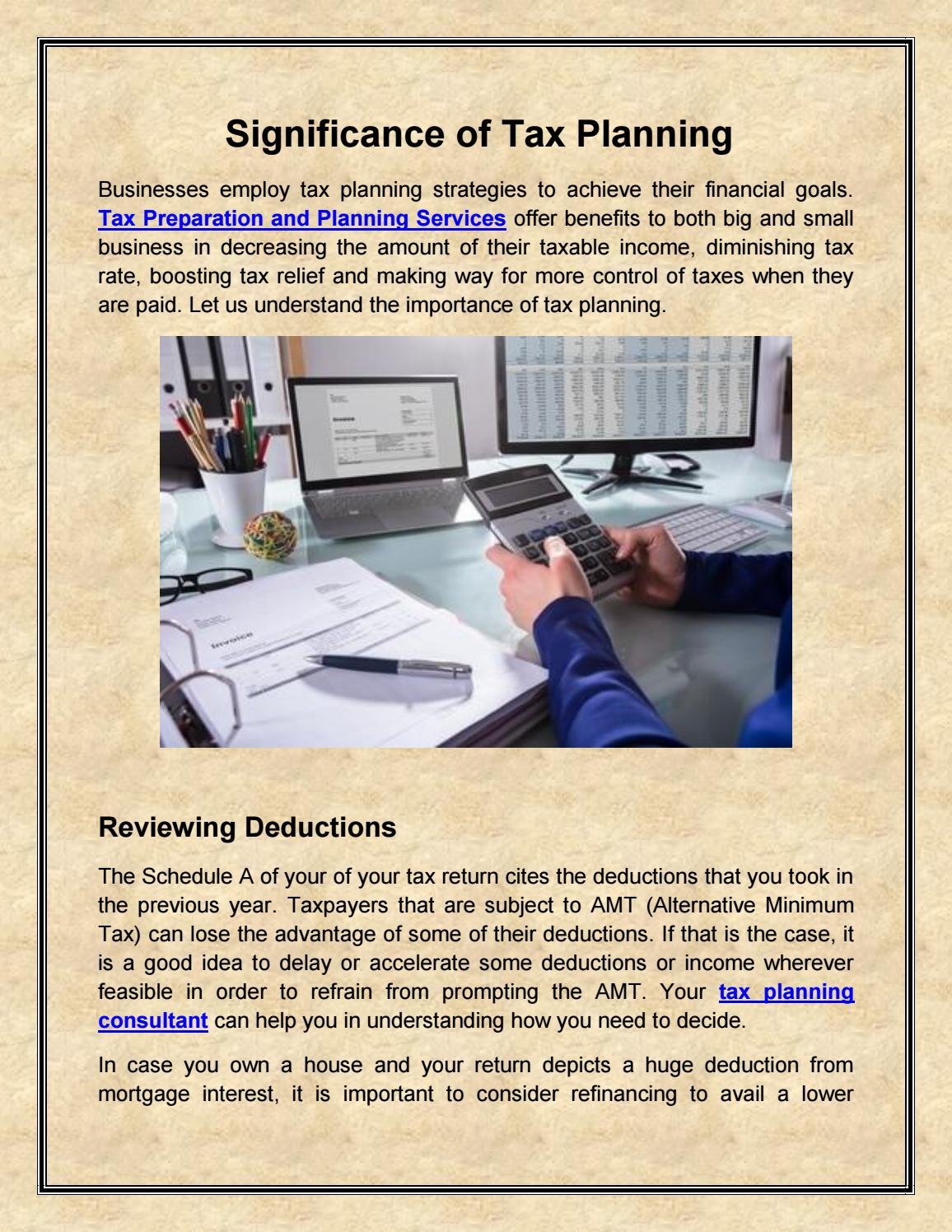Tax planning is a fundamental aspect of financial management. It is the proactive approach to ensuring that you optimize your tax liabilities and capitalize on potential savings. Understanding the importance of tax planning is crucial for individuals and businesses alike. By strategically managing your taxes, you can minimize the amount you owe while maximizing your financial growth. In this blog article, we will delve into the significance of tax planning, providing you with practical insights and tips on how to navigate the complexities of the tax system. So, let’s dive in and explore the world of tax planning together.
Understanding the Importance of Tax Planning
Tax planning is a crucial aspect of personal and business finance that helps individuals and organizations optimize their tax liabilities within legal boundaries. By proactively strategizing their financial decisions, individuals and businesses can effectively minimize their tax burden and maximize their after-tax wealth. In this comprehensive guide, we will delve into the intricacies of tax planning, exploring its importance, benefits, strategies, and key considerations.
Why is Tax Planning Important?
Effective tax planning plays a vital role in financial management and can have various benefits for individuals and businesses alike. Here are some compelling reasons why tax planning should be a priority:
1. Minimizing Tax Liability:
Tax planning allows individuals and businesses to take advantage of available deductions, exemptions, credits, and other tax-saving strategies to reduce their overall tax liability. By understanding the tax code and planning ahead, taxpayers can legally minimize their tax burden, saving significant amounts of money.
2. Maximizing After-Tax Wealth:
By reducing tax liabilities, tax planning enables individuals and businesses to retain a larger portion of their income or profits. This additional capital can be reinvested, saved, or used to fuel growth, ultimately increasing overall wealth and financial stability.
3. Avoiding Tax Penalties:
Accurate tax planning ensures compliance with tax laws and regulations, reducing the risk of penalties, fines, or legal issues associated with improper or late tax filings. By staying proactive and organized, taxpayers can avoid unnecessary financial and legal consequences.
4. Enhancing Cash Flow:
Tax planning involves careful consideration of income, expenses, and timing of transactions. By optimizing cash flow management, individuals and businesses can align their finances to minimize tax payments and improve their overall financial health.
5. Achieving Financial Goals:
Tax planning is an essential component of comprehensive financial planning. By strategically structuring investments, retirement plans, and other financial decisions, individuals can align their tax strategies with their long-term financial goals, such as retirement, education funding, or asset accumulation.
Effective Tax Planning Strategies
While tax planning strategies may vary depending on individual circumstances, here are some commonly used techniques to optimize tax liabilities:
1. Timing Income and Expenses:
By carefully timing the receipt of income and the payment of expenses, individuals and businesses can shift their tax obligations between different tax years. This strategy involves accelerating deductible expenses into the current year and deferring taxable income to future years, ultimately reducing the tax burden in the current year.
2. Taking Advantage of Tax Deductions:
Tax deductions are expenses or contributions that can be subtracted from taxable income, thereby reducing the overall tax liability. By identifying and leveraging available deductions, such as mortgage interest, medical expenses, or charitable contributions, taxpayers can lower their taxable income and potentially enter a lower tax bracket.
3. Utilizing Tax Credits:
Unlike deductions, tax credits directly reduce the amount of tax owed rather than just the taxable income. By understanding and utilizing applicable tax credits, such as the Child Tax Credit or the Earned Income Tax Credit, individuals and businesses can significantly reduce their tax liability.
4. Incorporating Retirement Plans:
Contributions to retirement plans, such as Individual Retirement Accounts (IRAs) or 401(k) plans, can provide immediate tax benefits. These contributions are often tax-deductible, reducing taxable income for the current year and allowing individuals to save for retirement while simultaneously minimizing their tax liability.
5. Choosing the Right Business Structure:
The choice of business structure can have a profound impact on tax liabilities. For example, forming a Limited Liability Company (LLC) or an S Corporation can provide tax advantages, such as pass-through taxation or self-employment tax savings. Understanding the tax implications of different business structures is crucial for effective tax planning.
6. Charitable Giving:
Charitable donations not only contribute to worthwhile causes but can also provide tax benefits. By donating to qualified charitable organizations, individuals and businesses can deduct the value of their contributions from their taxable income, reducing their overall tax liability.
7. Estate Planning:
Estate planning involves the management and transfer of assets to minimize estate taxes upon death. By implementing strategies such as trusts, gifting, or establishing a well-thought-out estate plan, individuals can ensure that their assets are distributed efficiently and with minimal tax consequences.
8. Consultation with Tax Professionals:
Given the complexity of tax laws and regulations, seeking advice from tax professionals, such as certified public accountants (CPAs) or tax attorneys, can be invaluable. These professionals have expertise in tax planning and can provide personalized guidance based on individual circumstances, ensuring compliance with tax laws while maximizing tax-saving opportunities.
Key Considerations in Tax Planning
While tax planning is essential, it is crucial to consider certain factors to ensure effective tax management:
1. Evolving Tax Laws:
Tax laws are subject to change, and it is important to stay updated on any modifications or new legislation that may impact tax planning strategies. By keeping abreast of tax law changes, individuals and businesses can adjust their planning accordingly and take advantage of any new opportunities or incentives.
2. Individual Circumstances:
Tax planning strategies should be tailored to each individual or business’s unique circumstances. Factors such as income level, filing status, family size, business structure, and financial goals can influence the most effective tax planning approach. It is essential to consider these factors when developing a tax strategy.
3. Documentation and Recordkeeping:
Maintaining accurate and organized financial records is crucial for effective tax planning. Detailed documentation and recordkeeping can help substantiate deductions, credits, and other tax-related claims, ensuring compliance with tax laws and helping avoid potential issues in case of an audit.
4. Long-Term Financial Goals:
Tax planning should be aligned with long-term financial goals. It is essential to consider factors such as retirement planning, education funding, business expansion, or wealth accumulation when devising tax strategies. By integrating tax planning into broader financial planning, individuals and businesses can achieve comprehensive and sustainable financial objectives.
In conclusion, understanding the importance of tax planning is essential for individuals and businesses aiming to optimize their tax liabilities, enhance their financial well-being, and achieve long-term financial goals. By implementing effective tax planning strategies and staying proactive, taxpayers can maximize their after-tax wealth, minimize tax penalties, and improve overall financial health. Investing time and effort into tax planning can yield significant benefits, making it a crucial aspect of financial management.
The Easiest Way to Understand Tax Planning
Frequently Asked Questions
Frequently Asked Questions (FAQs)
What is tax planning and why is it important?
Tax planning refers to the process of organizing your financial affairs in a way that minimizes your tax liability. It involves understanding the tax laws and regulations to optimize your financial decisions. Tax planning is important because it allows individuals and businesses to legally reduce their tax burden, maximize tax deductions, and take advantage of available tax credits, ultimately increasing savings and improving financial well-being.
How can tax planning help save money?
Tax planning can help save money by identifying tax deductions and credits that individuals and businesses may be eligible for. By strategically managing income, investments, and expenses, tax planning can minimize taxable income and reduce the overall tax liability. Additionally, tax planning can help individuals and businesses take advantage of tax-efficient investment strategies and retirement planning options, leading to increased savings over time.
What are some common tax deductions that should be considered during tax planning?
Some common tax deductions that should be considered during tax planning include:
– Charitable contributions
– Mortgage interest
– State and local taxes
– Medical expenses
– Business expenses (for self-employed individuals)
– Education-related deductions
– Retirement contributions
Are tax planning strategies different for individuals and businesses?
Yes, tax planning strategies can differ for individuals and businesses. While individuals focus on optimizing personal deductions and credits, businesses need to consider factors such as business expenses, depreciation, employee benefits, and tax credits specific to their industry. Consulting with a tax professional can help individuals and businesses develop tailored tax planning strategies based on their unique circumstances.
When is the best time to start tax planning?
The best time to start tax planning is as early as possible. By proactively planning your finances throughout the year, you can make informed decisions that allow for optimum tax benefits. Waiting until the tax season arrives can limit your options and may result in missed opportunities for potential tax savings.
What should I consider when choosing a tax professional for tax planning?
When choosing a tax professional for tax planning purposes, consider the following factors:
– Qualifications and credentials
– Experience in tax planning
– Reputation and client reviews
– Availability and responsiveness
– Fees and billing structure
– Compatibility and comfort level with the professional
Can tax planning also help with estate planning?
Yes, tax planning can play a significant role in estate planning. By carefully considering the tax implications of transferring assets and inheritance, individuals can minimize estate taxes and ensure a smoother wealth transfer to future generations. Integrating tax planning into estate planning can help protect assets and maximize the benefits received by beneficiaries.
What are the penalties for not properly planning for taxes?
Failure to properly plan for taxes can result in various penalties and consequences, including:
– Late filing penalties
– Late payment penalties
– Accuracy-related penalties
– Underpayment penalties
– Increased interest on unpaid taxes
– Audit risk and potential legal issues
It is essential to stay compliant with tax laws and regulations and seek professional guidance to avoid unnecessary penalties and ensure tax planning effectiveness.
Final Thoughts
Understanding the importance of tax planning cannot be overstated. Tax planning is a crucial aspect of financial management that allows individuals and businesses to optimize their tax liability within legal boundaries. By strategically managing their taxes, individuals and businesses can minimize their tax burden, maximize their savings, and ensure compliance with tax regulations. Effective tax planning involves careful analysis of income, expenses, deductions, and credits, enabling individuals and businesses to make informed decisions. By taking proactive measures to understand and implement tax planning strategies, individuals and businesses can navigate the complex tax landscape with confidence and achieve their financial goals.



